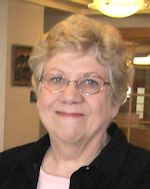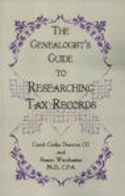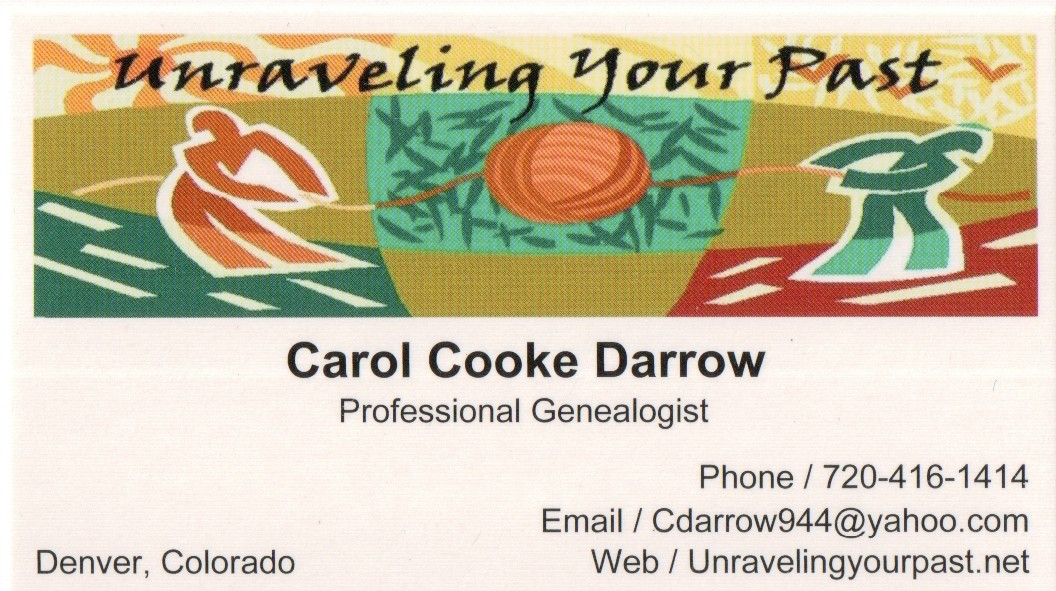Every Genealogical Search is Different
Every genealogical search is personal - whether you're looking for your great-grandparents or seeking credentials to join a lineage society. Every search is different and some are certainly easier than others. You may want to do your own research and don't know where to begin. Or you may have made a lot of progress until you hit a brick wall.
My goal for you is "Family Research on a Budget." If you've decided to do some research into your family history and need help, you can hire a professional researcher who can kick-start your research, resolve difficult identification problems, read antique handwriting, plat land holdings, and identify documents critical to your success. As a professional genealogist, I am qualified to do that research.
"Carol is a very experienced genealogist and she has a way of sharing her experience with her audience that informs, entertains, and challenges them to look deeper into their own family histories. Anyone, even non-genealogists, who have the opportunity to hear her speak should not pass up the chance to do so." -- Brad Morrison, Castle Rock

Carol Cooke Darrow is a professional genealogist who works as a lecturer and researcher. She has a degree in history from the University of Texas and is the co-author of The Genealogist's Guide to Researching Tax Records published in 2007. She is available to present at your genealogical meetings nationwide. Her current schedule of lectures and presentations is listed below.
 Carol Cooke Darrow and Susan Winchester are co-authors of the Genealogist's Guide to Researching Tax Records. The book is a how-to guide to help you identify, locate, and understand the wealth of information available in these annual records. Tax records can be as helpful as census records in locating ancestors who lived before the first census in 1790 or who lived in areas with lost census records. The book was published by Heritage Books and is available at www.HeritageBooks.com
Carol Cooke Darrow and Susan Winchester are co-authors of the Genealogist's Guide to Researching Tax Records. The book is a how-to guide to help you identify, locate, and understand the wealth of information available in these annual records. Tax records can be as helpful as census records in locating ancestors who lived before the first census in 1790 or who lived in areas with lost census records. The book was published by Heritage Books and is available at www.HeritageBooks.com
Professional Research Services
Here are a few of the professional research services available:
Hourly rates start at $40 per hour.
"Listening to Carol's presentations and her advice allowed me to successfully conduct the initial research of the family trees of both my father and mother. Her guidance and encouragement helped me write a book about my mother's genealogy--much of which had been lost with the family's emigration to the U.S." -- Sandra Gill, Thornton
Presentations and Lectures
College Hill Lecture Schedule
College Hill Library, WPL
3705 West 112th Avenue
Westminster, Colorado
All classes by ZOOM; register on Westminster Public Library website (use program regictration button for Adult Programs). You will receive an email link to the Zoom meeting Friday evening before the program. Registration ends at 1 pm Friday before the Saturday class.
| Date | Topic | Location |
|---|---|---|
| Saturday, August 2, 2025 1:30 - 3:30 pm |
Wills and Probate Records |
Register online at Westminster Public Libary-Adult Programs |
| Saturday, October 4, 2025 1:30 - 3:30 pm |
Confronting Mysteries and Misinformation in Your Family Tree |
Register online at Westminster Public Libary-Adult Programs |
| Saturday, December 6, 2025 1:30 - 3:30 pm |
Organizing Your Research into a Scrapbook or Narrative |
Register online at Westminster Public Libary-Adult Programs |
| Saturday, February 7, 2026 1:30 - 3:30 pm |
Women and Property: A Historic Record |
Register online at Westminster Public Libary-Adult Programs |
| Saturday, April 4, 2026 1:30 - 3:30 pm |
TBD |
Register online at Westminster Public Libary-Adult Programs |
| Saturday, June 6, 2026 1:30 - 3:30 pm |
TBD |
Register online at Westminster Public Libary-Adult Programs |
Beginning Genealogy Classes
| Event/Zoom Meeting | Date |
|---|---|
| Sign up at cogensoc.us and click on Beginning Genealogy icon to register. | 2nd Saturday of every month, 10:00 am – noon |
WriteNOW Writing Group
Classes on Zoom are held Sundays, 1:30 to 3:30 pm on ZOOM. Register to visit the cogensoc.us and you will receive a link to enter the meeting. You must register first to enter the ZOOM meeting.
| Event/Date | Topic |
|---|---|
| Sunday, September 14, 2025 | Personal introductions; possible projects and writing styles. Assignment for October: Write 500 words about one ancestor (or continue on your current project). |
| Sunday, October 12, 2025 | Adding details and other meaningful information into your story. Assignment for November: Add at least 500 words to your ancestor’s story (or continue on your current project). |
| Sunday, November 9, 2025 | Narrative Style: past, present, or future tense; first person or third person; jumpy transitions, punctuation and usage rules. Assignment for December: Write 500 more words about your ancestor (or continue on your current project). |
| Sunday, December 14, 2025 | Discuss narrative style and examples, transitions, pacing your story. Assignment for January: Write Introduction to your project and at least 500 more words. |
| Sunday, January 11, 2026 | Discuss clarifying confusing relationship references and handling difficult and sensitive topics. Assignment for February: Write 1,000 words on your project. |
| Sunday, February 15, 2026 (3rd Sunday) | Discuss photo editing, copyrights, illustrations including post cards, paintings, clip art, maps, diagrams. Assignment: Write an introduction to your project. |
| Sunday, March 8, 2026 | Discuss manuscript preparation, Word, pdf, styles, layout, page numbering, front material. Assignment: Use layout form to design your book allowing for copyright page, dedication, acknowledgements, maps, family trees. |
| Sunday, April 12, 2026 | Discuss electronic publishing including Office Depot, Lulu.com, others. Assignment: Write a conclusion to your project. |
| Sunday, May 17, 2026 (3rd Sunday) | Presentations of projects. Assignment for the summer: Finish your current project; plan for your next project. |
Lecture Topics
The U.S. Bureau of Land Management (BLM) is full of treasures. There are documents dealing with Cash Sales of land across the U.S. There are Military Bounty Land assignments and, after 1862, there are Homestead patents “to secure homesteads to actual settlers on the public domain.” The BLM also granted Timber Culture (1873), Homestead Entry-Stock Raising (1916) and Mineral Patents, Indian Allotments, and the list goes on and on.
Marriage, separation and divorce shaped the lives of all of our ancestors and their descendants. What started out as a dream of love and happiness may have turned into a nightmare of arguments, separation, divorce or desertion. Record forms changed over the centuries and finding records of those events, both happy and sad, are the challenge of the genealogist.
In the beginning women owned nothing. They were under the control of fathers and then husbands. Royalty owned all land and granted it to men who did them service. Transferring that process to the wild frontier on the American continent forced changes in the customs and eventually laws of land ownership.
The census taker came every ten years and often missed people. The tax man came every year and he rarely missed anyone. Carol Darrow will explain how tax records can be a great substitute for census records, a wonderful guide to the land and personal property of your ancestors, and a source of surprising information including the type of house, the location of the land, the neighbors, and sometimes even the occupation of your ancestor.
County deed records contain an amazing amount of information about our ancestors including how and when they acquired the land, the land description, mortgages and debts, and when they sold out and moved on.
Immigrants were typically pushed to leave their home country but the welcome in the new country was not always assured. Americans envisioned a melting pot where differences would be submerged. Immigrants often sought to recreate their homeland in America.
Information such as occupation, education, even cause of death supplemented with newspaper stories, county histories, maps, journals and diaries can help you round out the picture of your ancestor and the world he lived in.
Whether seeking gold, freedom or more land, Americans moved across the continent. As new territories opened up, people felt the need to move westward.
Deciphering the messages written in stone on tombstones can enrich your understanding of your ancestor.
Whether you're writing a compiled genealogy or a family history, putting the facts on paper and bringing the ancestor to life can be challenging and fun.
To succeed at European genealogy research, you must learn about the standard records of the country of your ancestors through websites, books, maps, and genealogy societies devoted to that country. The growing number of online resources will help to speed you on your way.
Collecting and recording information about your ancestor on specialized charts and timelines can help you clear up the confusion and clarify the story of your ancestor.
The things that seem to be standing in the way of your genealogical research may be easy to overcome when you have carefully identified the road block and learned effective ways to overcome it.
Castle Garden opened as a New York City facility for processing the crowds of immigrants arriving between 1855 and 1890. Ellis Island, a federal immigrant receiving station replaced it in 1891.
Use online tools to locate the final resting place for your ancestor and find obituaries.
Leaving your home country to set sail for America was sometimes a wrenching decision. The trip was filled with dangers and hardship, and the welcome was not always friendly. Learn about your ancestor's decision to leave the home country and the experience of journeying to America.
Most genealogy records are created on the local level so it's vital that you learn as much as possible about the county boundaries, history, maps, population, geography, religions, crops, and occupations of your ancestor's hometown. When you become an expert on that location, you will find the records you're looking for.
Becoming a citizen was not always easy and finding naturalization records can be a challenging task.
Maps come in all shapes and detail. Finding the right map can lead you all the way back to your ancestors.
People are affected by the belief system, the laws, the climate, and the technology, as well as religious and ethnic influences of the time they live in. We want to know why they do what they did.
Learn how the administration and probate process can tell us about the life of the deceased and clarify family relationships.
"I always learn something new when you are the speaker!" -- Susan Seager, Weld County

.....
